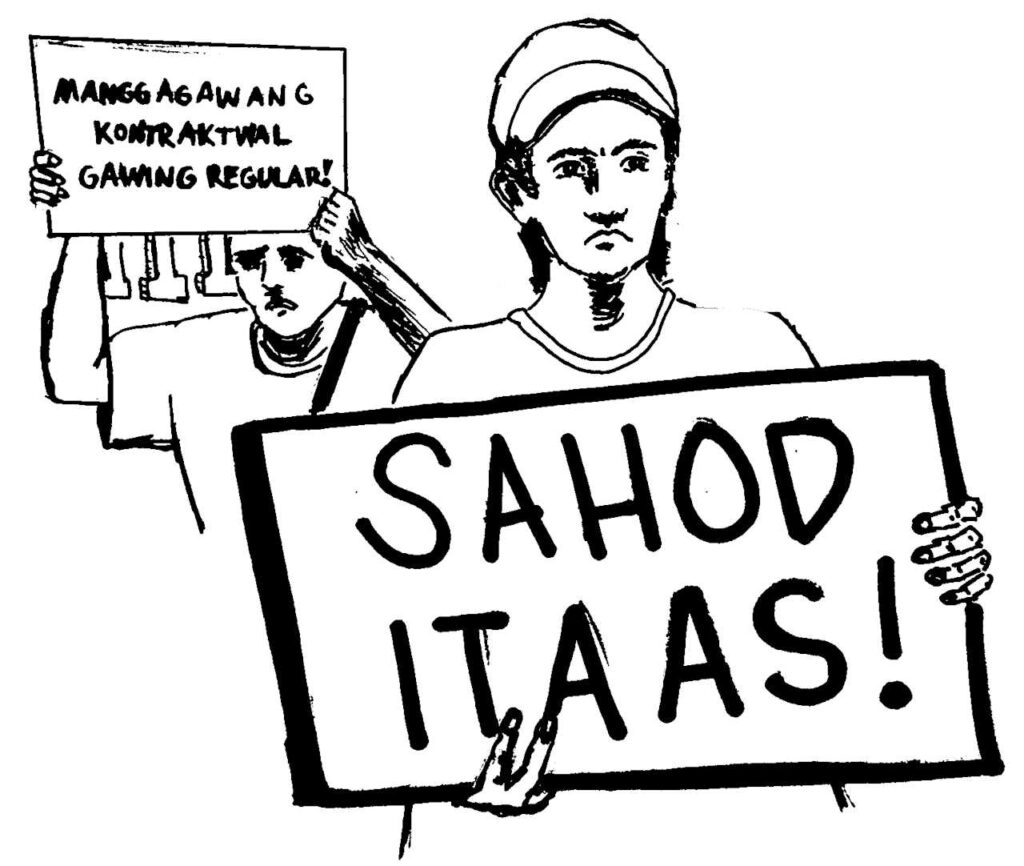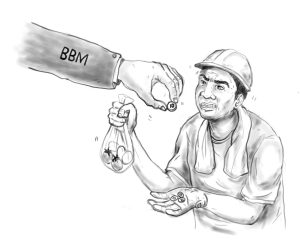Workers intensify fight for substantial wage increase


Dong is troubled over where to get money for his three children, one of whom is already in college. “On the 15th, I got only eight thousand,” he said. Dong is a foreman in a large Manila port. He is not the lowest wage earner among more than 800 dockworkers who find it more difficult to keep up with the needs of their families.
Because he earns ₱800 per day which is higher than the minimum, Dong and other co-workers are not covered by the meager ₱40 daily wage increase for workers in the National Capital Region (NCR) in June. But his salary is still way below the ₱1,187 daily needed for a family to live decently.
Worse, they do not have daily work at the pier. “We are considered regulars, but often we work only up to eight to 10 days in two weeks,” said Dong.
Last year, more than 500 dockworkers formed a union to protect their rights. But management seized control of the union and its lawyers. Dong is now planning to push the election to replace the said union with a genuine one that will protect their rights.
This November, union members held a meeting. They talked for three hours, from 7 to 10 in the morning. During this period, the workers estimate that the company lost as much as ₱2 million. Dong says: “What more if we go on strike? This is why management fears us.”
Union struggle and the labor movement
Like Dong, many workers struggled to expand and strengthen the union movement as foundation of workers’ bargaining power with capitalists. This year, strikes and protests broke out in several factories in Southern Tagalog and NCR amid deadlocks in negotiations for collective bargaining agreements or CBA.
In these negotiations, workers primarily demand wage increases, which in many cases were last given by capitalists before the pandemic. Theses include the Fuji Electric Phils. in Laguna and Samahan ng mga Manggagawang Nagkakaisa sa Umicore Specialty Chemicals in Subic, Pampanga. Bread workers in Laguna achieved victory for their union Panadero ng Philfoods Fresh Baked Product Inc against the union unleashed by management and NTF-Elcac.
The labor movement this year gave a fresh impetus to the Sahod Itaas, Presyo Ibaba! (Increase Wages, Bring down prices!) campaign. Various labor groups sought for a dialogue with the Marcos regime but were ignored.
They supported the national minimum wage bill in Congress and a Senate proposal for a ₱150 across-the-board wage increase. The Congress bill lies dormant while that in the Senate remains at the “principle” level. In the regions, local federations and unions filed petitions before regional wage boards, but their orders were skimpy, delayed and will be given in trickles. (See related article.)
“Organizing and mobilizing workers is decisive,” according to Rene, a labor-leader in a workers’ enclave. As history has taught, the capitalist or reactionary state will not voluntarily give any increase unless their resistance is strong, bold and militant. It has been thirty-four years since the state was last compelled to grant a significant wage increase.
Need to strengthen
Together with the struggle for wages, labor movements strengthen its solidarity with different sectors.
Also part of the struggle of workers is to defend against the attacks on their organized ranks by the Marcos regime and the capitalists. In September, Jude Fernandez, veteran organizer of the labor movement, fell victim to extrajudicial killing. In the Southern Tagalog and Caraga regions, some labor leaders were abducted while others were illegally arrested. In Davao and Cebu, regional center leaders are targets of threats to compel them to “cooperate” with the military’s counterinsurgency campaign.










